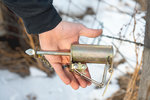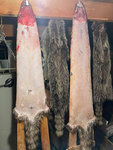Cloudy, 30° F
Raccoons are often portrayed as cute and cuddly.
“They aren’t nice,” said Toby Hooper, 20, of Powell.
That is an understatement. The reality is raccoons are dangerous if …
This item is available in full to subscribers.
The Powell Tribune has expanded its online content. To continue reading, you will need to either log in to your subscriber account, or purchase a subscription.
If you are a current print subscriber, you can set up a free web account by clicking here.
If you already have a web account, but need to reset it, you can do so by clicking here.
If you would like to purchase a subscription click here.
Please log in to continue |
|




Raccoons are often portrayed as cute and cuddly.
“They aren’t nice,” said Toby Hooper, 20, of Powell.
That is an understatement. The reality is raccoons are dangerous if cornered and a threat to domestic animals that may try to defend their own homes or territory from the masked interlopers. They are deadly if they gain entrance to a chicken coop or pen and are eager to help themselves to livestock or pet food left unattended.
If the feed is contaminated by raccoon urine or feces, it can transmit disease to animals — such as cattle, horses or pets — that eat the feed. The diseases carried can include: leptospirosis, which may cause abortion or stillbirth in cattle; toxoplasmosis, a parasite that is dangerous to pregnant women and anyone with a compromised immune system; and viral diseases like rabies, canine distemper and canine hepatitis.
Keeping down the population of raccoons in rural areas of Park County is where Hooper and his brother-in-law, Tristan Nicholson, 24, come in. They are trappers and run Double T Trapping in Powell.
They know quite well that the term has become a dirty word in parts of the nation and pressure is growing to end the practice even in Wyoming. But they also know there is a need for what they do and a way to do it ethically.
Hooper was introduced to trapping as a teenager by a now-passed relative. That gentleman gave Hooper his old traps and showed him how they worked. Hooper also watched YouTube videos, then job-shadowed government trappers. Nicholson learned from Hooper after the two became in-laws.
“When you say trap, people think of those giant bear traps that could break your leg,” Hooper said. “But those are antiques, not what we use.”
He and Nicholson work on farms and ranches where the owners have had a problem with raccoons or, sometimes, other wildlife or predators. The young men set up their trap lines using what are known as dog-proof traps. Similar to the childhood gag of a finger trap, it allows only animals with small paws like a raccoon or skunk to put its paw into the device, but not withdraw it. There are no teeth.
“Sometimes we might get a cat caught, but we just turn them loose. They aren’t hurt,” Nicholson said.
The pair use the dog-proof traps because they do not want to harm domestic animals that might come in contact with the devices.
Because trapping is under such close scrutiny, Hooper and Nicholson check their lines more often than required by current law, usually every other day. It takes about an hour and a half to run the lines, plus travel time to and from the site.
“If we aren’t at work, we’re out trapping, checking the lines or dealing with the animals,” Nicholson said.
A trapped animal is quickly put down — shot — and removed from the trap. One nail is clipped and taken to a local sporting goods shop to collect a bounty. Right now, raccoons have a $10 bounty, but the hides are only worth about $3. That is because there are so many raccoons being brought in, Hooper said.
In addition to farm or ranch land, the pair is most often called in to find and stop animals terrorizing chicken coops.
“We want to do it to help people while being humane and ethical about it,” Nicholson said.
They hope to soon expand to include live trapping inside town limits. Then they would be able to remove raccoons and similar wildlife from attics, under porches and sheds where the animals might like to set up housekeeping. However, working in town will take time to get a small business license, obtain the required permits and purchase multiple live traps.
Trapping for Nicholson and Hooper is a side gig and each also is an avid hunter and fisherman. They share the undertakings with their children.
“We want to keep this way of life going, especially in Wyoming, “ Nicholson said. “And they are good skills to have.”
“We definitely want to keep it going,” Hooper added. “We take the kids along, but we are teaching them responsibility and the serious part of taking a life. It is all done with a purpose.”
There will be some predator control during calving season, but trapping is predominately a cold weather endeavor. As the weather warms, animals like raccoons become more active but are less of a problem because there is more for them to eat.
Then each trapper will focus on their regular jobs — construction for Hooper and oil field work in the Dakotas for Nicholson.
But when the air starts to cool, they will be back at it, hunting, fishing and trapping, carrying the old traditions on their young shoulders.